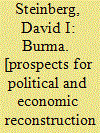| Srl | Item |
| 1 |
ID:
052150


|
|
|
|
|
| Publication |
Cambridge, World Peace Foundation, 1997.
|
| Description |
51p.
|
|
|
|
|
|
|
|
|
|
|
|
Copies: C:1/I:0,R:0,Q:0
Circulation
| Accession# | Call# | Current Location | Status | Policy | Location |
| 038608 | 320.9591/STE 038608 | Main | On Shelf | General | |
|
|
|
|
| 2 |
ID:
106986


|
|
|
|
|
| Publication |
Oxford, Oxford University Press, 2010.
|
| Description |
xi, 216p.
|
| Standard Number |
9780195390681
|
|
|
|
|
|
|
|
|
|
|
|
Copies: C:1/I:0,R:0,Q:0
Circulation
| Accession# | Call# | Current Location | Status | Policy | Location |
| 055660 | 951.1/STE 055660 | Main | On Shelf | General | |
|
|
|
|
| 3 |
ID:
093146


|
|
|
| 4 |
ID:
095124


|
|
|
|
|
| Publication |
2010.
|
| Summary/Abstract |
Myanmar has been one of a number of countries that the new American Executive branch selected for policy reconsideration. The Obama administration's review of relations with Myanmar, characterized as a 'boutique issue' during the presidential campaign, has received considerable attention in 2009, and in part was prompted by quiet signals sent by both sides that improved relations were desirable. Begun as an intense policy review by various agencies, it has been supplemented by the first visits in 15 years to the country by senior US officials. The policy conclusion, that sanctions must remain in place but will be supplemented by dialogue, is a politically realistic compromise given the strong congressional and public antipathy to the military regime and the admiration for Aung San Suu Kyi, whose purported views have shaped US policies. US claims of the importance of Myanmar as a security and foreign policy concern have also been a product of internal US considerations as well as regional realities. US-Burmese relations since independence have been strongly influenced by the Cold War and China, whose strategic interests in Myanmar have been ignored in the public dialogue on policy until recently, with US policy focused on political and human rights concerns.
Attention is now concentrated on parliamentary and local elections to be held in 2010, after which the new constitution will come into effect and provide the military with a taut reign on critical national policies while allowing opposition voices. Future relations will be strongly influenced by the transparency and freedom both of the campaigning and vote counting, and the role-if any-of the opposition National League for Democracy. Strong scepticism exists in the US on prospects unless the Burmese institute extensive reforms. The Burmese military, presently controlling all avenues of social mobility, will have a major role in society for decades. The article initially evaluates US policies towards Myanmar prior to 1988, when a military coup marked a negative shift in US-Myanmar relations, from cooperation to a US sanctions regime. It looks at the influence China's involvement in Myanmar and the role Aung San Suu Kyi have had on the formulation of US policy towards the country and assesses the prospects for the US-Myanmar relationship under the Obama administration.
|
|
|
|
|
|
|
|
|
|
|
|
|
|
|
|